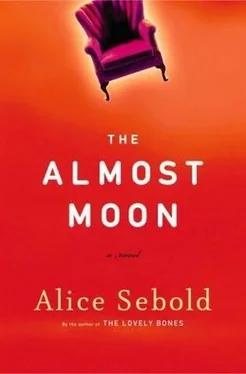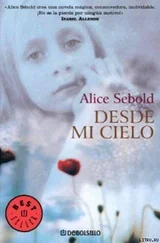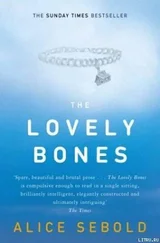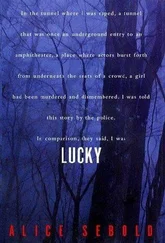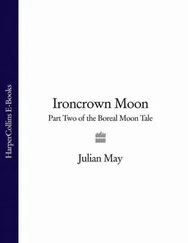My eyes staring back at me were small and black, and behind them was a room I’d avoided all my life. My parents were waiting for me, I thought, and in the small wallpapered bathroom of Mrs. Leverton’s house, I could, if I wanted to, blow my brains out. My father had killed himself, I had killed my mother, and I could join them both. If I hustled, perhaps I could be interred with my mother, head to toe-our own jumbled version of The Lovers of Pompeii.
Quickly, I shut the light off. I set the purse down, and in the dark I washed my hands and face, splashing the water cupped in my two palms against my skin, running the tap ice-cold. I saw her then, Emily racing up to me beside the pool at the Y. She was holding something out to me and smiling widely.
“My Flying Fish Badge,” she said. “I got it!” In the weeks leading up to my father’s death, she had mastered the butterfly.
I did not turn on the light again but stood over the sink, breathing heavily. I willed myself to open the door. I picked up my purse as if it were some stranger’s bowling bag and made my way into the kitchen and over to the round dining table, where I sat down in a wicker-backed chair. I moved my hand over the smooth grain of the table. Mrs. Leverton had left no crumbs from her evening meal.
I thought of the girls.
Once, when the three of us were visiting my mother, and Emily and Sarah were still small, we had been walking down the street on the way back to the house from the park, where a new jungle gym had been installed. The girls were excited and wild. Sarah had run up Mrs. Leverton’s walk and started stamping on the concrete with her foot.
“See, it’s not like Grandmom’s!” she yelled.
“Sarah, get back here. That’s not your house.”
She had stared at me, nonplussed. “I know that,” she said. Emily looked up at me to see what came next.
Mrs. Leverton was what. She tapped on her front glass-single-paned back then-and as I hurried up the walk with Emily to retrieve my errant child, the front door opened fast.
“Why not come in?” she said. “Daughters must be lovely things.”
And though my mother hated her and she disapproved of me, we went into her house and sat in the living room, which Arlene cleaned every other Friday. We had store-bought cookies from a tin, and Sarah told her about how, at her grandmother’s house, there was a hollow spot under the front path.
“The sound changes when you walk on it,” Emily clarified.
“And Mom says there are tiny people who live in there,” Sarah said.
“Does she?” Mrs. Leverton looked at me and made an effort to smile. Crumbs from a shortbread cookie sat at the corner of her mouth.
“A whole village,” Sarah said excitedly. “Right, Mom?”
I did not say anything.
“Like Gulliver’s Travels, ” Emily said. “Sarah likes to imagine them.”
There she was, I thought, at nine, already a better mother than I was. She had taken the lead with Mrs. Leverton so that Sarah would not notice my disappearance. I had wondered if all mothers shared a fear of how vibrant and alive their children were.
I put my hands together.
“God, forgive me,” I said softly.
I had set my purse on the floor beside me, and I leaned over to pick it up and place it on the table. I pushed back my chair a foot or so and reached my hand in. There was the felt between my fingers. I searched for the braided gold twine and pulled out the Crown Royal bag. It made a loud clunk against the table. Next I took out the box of bullets. I put the box beside the bag. I stared at the purple felt. Even taking the gun out seemed unfathomable.
I stood up.
The clock over Mrs. Leverton’s sink had a blue neon circle surrounding it-a faux diner clock. They had the real McCoy at Easy Joe’s.
It was only 7:45 p.m. It felt like three o’clock in the morning. Finally, I thought, I had reached the future that was no future.
I saw the teapot on the stove and decided that I would make a cup of tea. A stalling tactic, no doubt, but what was and wasn’t reasonable had left me. Everything was reasonable if killing your mother was. Everything was reasonable if giving up your life was second nature.
I did not want to think. I became methodical. I filled the teakettle and made sure not to replace the blue whistling bird on its spout. I pushed back images of my father in his terry-cloth robe and my mother wrapped in the Mexican wedding blanket, toppling to the basement floor.
I brought the water over to the stove and turned on the flame. I could not leave this way. Not, I thought, without a letter, not as my father had left me, had left my mother. I had chosen Mrs. Leverton’s because it made sense. It was empty. But I also knew now that it was a house they would never have to enter, my head blown off a sight they would never have to see.
I opened one cabinet and then another, finding the cups in this second one. Mrs. Leverton did not have hooks with mugs or pots hanging on them. She had good china and everyday. Mugs, to my mother, had also been abhorrent things. How nice it would have been if they had known each other. Visited. Done something besides send cards at the appropriate moments-the birth of grandchildren, the death of men-but it was my mother who had pointed out their reality. “Just because we’re old doesn’t mean we change into friends.”
I knew that, like my mother, Mrs. Leverton would no doubt have a drawer in the house that held stationery-perhaps a whole chest of drawers. It was one of the fallback gifts for an old lady. How many shawls or boxes of note cards had Mrs. Leverton been given in her ninety-six years? “Cash,” Jake reported his father had said to him near the end. “If it isn’t cash, I’m not interested.” He joked with Jake that he wanted to die clutching a thousand-dollar bill in each hand. “I didn’t have the heart to tell him they didn’t exist anymore,” Jake said.
I left the water to boil. Who cared if I burned the house down?
I went to the door that led to the living room. In the center of the wall across the room, there stood a highboy desk. The bottom edge was illuminated slightly by a light-sensitive night-light. I looked to my left and saw another of these lights. Green circular disks jutted out of random outlets so that Mrs. Leverton or a happy burglar could pick his or her way through her downstairs rooms.
Once, my parents had fought about the light bill. My mother insisted that every light in the house remain on even when it was sunny out. Even when I was at school or my father away on a business trip.
“Why? Why all these lights?” he had asked, waving the bill in her face as she sat on the couch, unraveling a thread at the hem of her dress.
“I’m not a bank,” he said, before grabbing his hat and coat to go out.
Later I told him that it must have something to do with the operation-her mastectomy. That she thought the light was helping her heal, and that if he was patient, I was sure she would return to using lamps only in the rooms where she sat. Four months later, she did. I never knew what had caused it. I had made up the lie to keep things as they had always been.
In a drawer under the foldout desk, I found the stationery. I would write the first letter to Emily. She deserved what she had never gotten from me, what she so much wanted: an explanation. Why I was the way I was despite what she thought of as free will and the endless possibilities that she had never seen me grasping.
I could not make out the designs of the paper or the colors, and I did not want to write my suicide note on card stock lined with Holly Hobbie dolls. I grabbed the three boxes of stationery in the narrow drawer and stacked them in my free arm before shoving the drawer closed with my hip and opening the one below it. I smiled. On one side was a soft lump, and when I touched it, I could feel the looped wool of what must have been a shawl or blanket. To the left of this were more boxes. I lifted one out-cribbage-then replaced it. Another-a deck of cards, still in cellophane. I threw it back. The next box was obviously a vestige of her grandsons: a Crayola one-hundred pack with built-in pencil eraser. I took this.
Читать дальше
